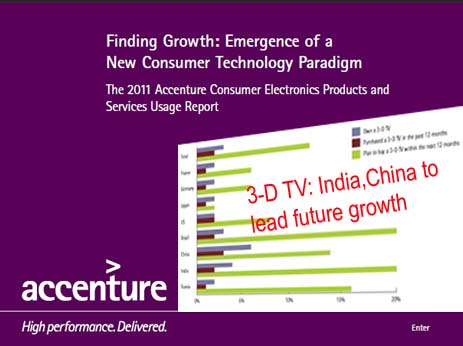
Highlights of the 2011 Accenture Consumer Electronics Products and Services Usage Report
A new survey by global management consulting, technology services and outsourcing company Accenture, predicts that consumer purchase rates for personal computers and mobile phones (excluding smartphones) will decline by 39 percent and 56 percent this year compared with last year, respectively. By contrast, buying rates of 3DTVs (three-dimensional TVs) are expected to rise 500 percent; tablet computers 160 percent; ebook readers 133 percent; and smartphones 26 percent. the annual survey focused on usage and spending on 19 different consumer electronics technologies among more than 8,000 consumers in eight countries in both emerging markets and developed economies: Brazil, China, India, Russia, France, Germany, Japan and the United States.
A widening enthusiasm gap the urban consumers in Brazil, Russia, India and China (the BRIC markets) have leapfrogged the average maturemarket consumer in their use of technology. They have a much greater appetite for consumer technology from many measures, including the devices they own, their purchase plans and their use of applications. Counter to common misperceptions, a large segment of BRIC consumers are more interested in the newest and most innovative technologies than in the lower price point technologies with less functionality. BRIC market consumers have a higher rate of adoption of the newest technologies and a greater willingness to pay premiums for features and enhancements. For instance, a full 84 percent of Indian respondents say they will pay a premium for enhanced smartphone capabilities. That translates into roughly 148 million consumers.
For four consecutive years Accenture’s Electronics & High Tech industry practice has conducted research to identify and track preferences for consumer technologies and services. The research is intended to help consumer technology executives better understand the purchase and use of consumer technologies among key generations and to gain deeper insights into global differences. For the 2011 research Accenture conducted a quantitative online consumer study comprising 8,002 interviews across eight countries.The research, fielded in October and November, 2010, sought to cover a demographically representative sample across all the geographies. New to this year’s research is Accenture’s 2010 Consumer Technology Power Rankings, which ranks the year’s most pervasive consumer technologies and their projected rate of growth. The rankings bring particular insights into consumer’s intentions relative to the newest and fastest growing technologies. One of the fascinating rankings reveals that while the growth rate of personal computers is expected to decline, the growth rate of tablet PCs is expected to increase by 160 percent
The survey found that only 17 percent of survey respondents plan to buy a desktop or laptop computer in 2011-- a 39 percent drop from 2010: ,Respondents are using multiple devices such as tablet PCs for activities that used to be done on traditional PCs. “The research findings raise the question as to whether, in the long run, desktop and laptop PCs in the home will be increasingly replaced by a group of newer technology alternatives such as tablet computers, netbooks, smartphones and e-book readers,” said Kumu Puri, senior executive with Accenture’s Electronics & High-Tech Practice. “If strength is measured by unit sales, the computer will remain the strong consumer technology giant for many years. Our research found that 93 percent of survey respondents own a computer—a higher proportion than any of the other 19 technologies included in the survey. But if measured by growth rate, the PC market--at least for consumers--has reached a level of saturation and will continue to see diminished growth rates. There’s increasing potential for an end in sight for the relevance of the personal computer in the home as we know it today.”
The research also found that ownership of basic mobile phones dropped from 79 percent in 2009 to 65 percent in 2010. In the same period, ownership of smart phones quadrupled from eight percent to 32 percent. In the survey, mobile phones were described as having basic voice capability but not the enhanced features available on smart phones, such as surfing the Internet.
3D TVs
Unlike purchases of PCs and mobile phones, purchase rates of 3D TVs are expected to grow this year at the fastest rate--500 percent—of all 19 technologies included in the survey. As con¬sumer electronics companies consider ways to increase demand for 3D TVs, price emerged as the biggest lever for driving greater interest in this new technology product. According to the survey, 57 percent of respondents said they would be more inclined to buy a 3D TV if the price were within their budget. Finding this price point was more significant among respondents under 24 years old (64 percent) than respondents who were older (50 percent). Other factors respondents said would make them more inclined to buy a 3D TV included having greater availability of 3D content and not having to wear 3D glasses.
Among respondents in all eight countries surveyed, China and India were among the most enthusiastic purchasers and users of the latest consumer technologies. While two percent to three percent of respond¬ents in most countries own a 3D TV, twice that many Chinese respondents say they own one. Sixty-nine percent of the nation’s respondents want or plan to own a 3D TV, compared with only one-fourth of U.S. consumers and one-fifth of Japanese consumers. The number for India is almost head to head with China.
For a copy of the complete set of survey findings, please visit https://microsite.accenture.com/landing_pages/EHT/Documents/Accenture_GlobalConsumerTech_2011.pdf
January 5 2011